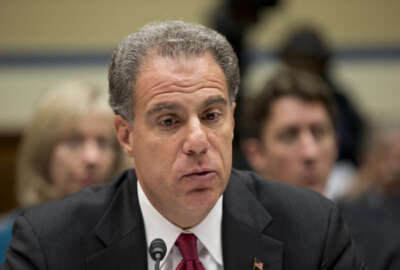
Justice IG: Legal decision turns independent oversight on its head
Michael Horowitz, inspector general at the Justice Department, says a recent decision by his agency's Office of Legal Counsel threatens the independent oversight of...
Inspectors general must now obtain permission from their agencies before gaining access to certain documents like grand jury proceedings, wiretaps or credit information, according to a recent decision from the Justice Department’s Office of Legal Counsel.
The inspector general community called this decision another attack against the independent oversight at the center of its responsibilities.
“The bottom line to this is that it comes down very much to, ‘Do you want independent oversight or do you not want independent oversight?'” Michael Horowitz, inspector general at the Justice Department and director of the Council of Inspectors General on Integrity and Efficiency (CIGIE), told In Depth with Francis Rose Tuesday.
“The outcome of the OLC opinion is, ‘Yes, IGs, you might be able to get access to that kind of information. But, no, you can’t get it independently,'” he said. “‘The Inspector General Act does not allow you to access it. Instead, you can ask permission to get access to those records under the provisions applying specifically to grand jury, wiretap and credit information, but you don’t get to decide whether you get them. The employees of the Justice Department, who you oversee, will decide if your request meets the legal standards we’ve laid out.’ And that, in our view, is not independent oversight. It turns the whole principle of independent oversight on its head.”
The OLC’s decision grew out of legal objections put forward in 2010 by the FBI’s Office of General Counsel over the IG’s ability to access grand jury, wiretap and credit information. Prior to that, the IG had routinely received that information from DoJ and the FBI.
“No law changed,” Horowitz said. “No policy changed. Just the legal position of the FBI changed in 2010.”
In 2014, Deputy Attorney General James Cole appealed to the OLC for an opinion on whether the FBI’s objection was correct or whether the Justice IG had access to those records under the Inspector General Act of 1978. In the end, OLC sided with the FBI.
“For the purposes of our agency, overseeing four different law enforcement components at the Department of Justice — FBI, DEA, Marshals Service and ATF — it’s hard to imagine how we could conduct effective oversight of those law enforcement components if we’re prohibited from reviewing information like grand jury and wiretap information, particularly that those agencies frequently use to do their jobs,” Horowitz said. “We can’t do oversight when we can only see 50, 60, 70, 80 percent of the records. We need 100 percent access to do our job.”
Senate hearing looks at OLC decision
Last week, Horowitz testified before the Senate Judiciary Committee about OLC’s decision. He told In Depth that the senators were trying to understand why the change occurred.
Horowitz told the senators that since 1988, when Justice’s IG office was first established, it never mishandled the type of records being discussed. Witnesses from DoJ and the FBI affirmed that fact.
“If the inspector general has to protect sensitive information as well and has never violated any of the statutory restrictions, then what would be wrong with just providing the IG full access to everything under the same conditions prior to 2010?” asked committee Chairman Charles Grassley (R-Iowa), during the hearing.
Horowitz and his CIGIE colleagues are working on draft legislation to reaffirm that “all really means all” when it comes to what records IGs are able able to access under the Inspector General Act.
“I’ve actually had interactions as well with the Department of Justice on legislation that they think would override the OLC decision, that would in essence say, unless a law specifically says, ‘IGs can’t get it,’ the IG Act applies and overrides any other restriction,” he said. “Congress needs to be explicit that it doesn’t want IGs to get certain records.”
According to Horowitz, the IG community is unanimous in its view that the right of independent access has to be absolute.
“What this decision does is create uncertainty for staff of agencies we oversee and for whistleblowers as to whether they can walk into our office, or at least it potentially does, have them create risk of understanding whether they can walk into our office with information and with records that previously there was no question about,” he said.
Copyright © 2025 Federal News Network. All rights reserved. This website is not intended for users located within the European Economic Area.
Michael O’Connell is senior digital editor of Federal News Network optimizing content for the best user experience. Follow @moconnellWFED
Follow @moconnellWFED
Related Stories




